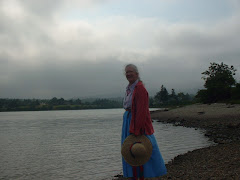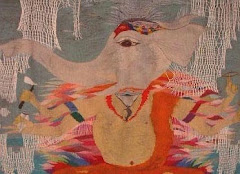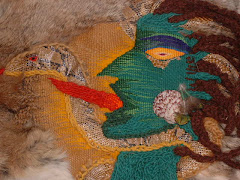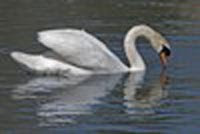Preparing for the Unforseen
Day after Christmas, 2004, Amritapuri, Kerala, India, on the shores of the Arabian Sea. Around noon. It’s a hot sunny day, with crows swooping and scolding, seemingly a normal sort of day. Then crows scatter and squawk as though disturbed about something, flying around like crazy. Suddenly a whooshing flood of ocean water explodes through brick walls enclosing the ashram. Men wildly shouting, women screaming. Water surges across the narrow peninsula and through the fishing village, smashing fishnet rigs that line the backwater river. What in God’s name is happening?
Only retrospect releases the story, and only piece by piece—your story, your friends’ stories, and the villagers’. Even then will you ever really comprehend it?
What about the morning of? Did anyone know? Had anyone felt what was coming the way horses and elephants do? I can’t honestly say I did. But I did feel the quake—all the way around, from the Sumatra Trench to the Arabian Sea side of India. I was sitting on the toilet and everything started to rock. Thinking I was dizzy and ill, I put my head down between my knees. When everything kept rocking, then I knew it was an earthquake. Having been raised in Southern California I was used to earthquakes. Big deal; I put it out of my mind.
Throughout the morning I felt dense, thick-minded, less-than-alert, maybe even depressed. But, in an ashram when you’re working on yourself, you can get depressed and not know exactly why. You accept it as a bummer, not as an indicator you are about to be inundated by a tsunami.
I’d always wondered how a person could avoid feeling, in the midst of accidents and tragedy. How could you not feel? With sirens blaring and red lights of emergency vehicles flashing, I wondered why? What happened? What was all the fuss? Maybe it’s over, for heaven’s sake. Let my friend Eiko and me go back to the ashram now. How was I to imagine we would spend five days as refugees, with only the clothes on our backs to wear and sleep in. Under equatorial sun, after half a day your clothes urgently need changing. And here I’d worried about dirty clothes, when villagers’ homes had been flattened, all their family’s possessions washed out to sea.
Do you see? From my position I hadn’t comprehended the damage the waves had wrought in the villages on the peninsula and in the ashram. My only solace is that I hadn't understood, because my friend and I were not in the ashram, not in the wave. We had been in the village on the other side of the backwaters and waiting for the ferry boat to take us across. While standing at the boat jetty, we saw the first wave flush across the peninsula and capsize a canoe; quickly we took to high ground fearing another wave, which became known as the killer wave.
And so bit by bit, I will tell the story as it was revealed to me, from others’ vantage points and my own, and all about the days that followed—the mass cremation, the cleanup, the sheltering and feeding of 15,000 villagers three meals a day, for many months. And the rebuilding of lives, of homes, of fishing boats—and the restoration of spirit.
Meanwhile, in our refugee camp we carried on. Many of us recognized that a little story our guru Amma had been repeating to us over the years had suddenly come to fruition. We talked about the fable one day as we sat chopping vegetables for tsunami refugees. One of the Indian women, a middle-aged ashram resident, told the tale:
Only retrospect releases the story, and only piece by piece—your story, your friends’ stories, and the villagers’. Even then will you ever really comprehend it?
What about the morning of? Did anyone know? Had anyone felt what was coming the way horses and elephants do? I can’t honestly say I did. But I did feel the quake—all the way around, from the Sumatra Trench to the Arabian Sea side of India. I was sitting on the toilet and everything started to rock. Thinking I was dizzy and ill, I put my head down between my knees. When everything kept rocking, then I knew it was an earthquake. Having been raised in Southern California I was used to earthquakes. Big deal; I put it out of my mind.
Throughout the morning I felt dense, thick-minded, less-than-alert, maybe even depressed. But, in an ashram when you’re working on yourself, you can get depressed and not know exactly why. You accept it as a bummer, not as an indicator you are about to be inundated by a tsunami.
I’d always wondered how a person could avoid feeling, in the midst of accidents and tragedy. How could you not feel? With sirens blaring and red lights of emergency vehicles flashing, I wondered why? What happened? What was all the fuss? Maybe it’s over, for heaven’s sake. Let my friend Eiko and me go back to the ashram now. How was I to imagine we would spend five days as refugees, with only the clothes on our backs to wear and sleep in. Under equatorial sun, after half a day your clothes urgently need changing. And here I’d worried about dirty clothes, when villagers’ homes had been flattened, all their family’s possessions washed out to sea.
Do you see? From my position I hadn’t comprehended the damage the waves had wrought in the villages on the peninsula and in the ashram. My only solace is that I hadn't understood, because my friend and I were not in the ashram, not in the wave. We had been in the village on the other side of the backwaters and waiting for the ferry boat to take us across. While standing at the boat jetty, we saw the first wave flush across the peninsula and capsize a canoe; quickly we took to high ground fearing another wave, which became known as the killer wave.
And so bit by bit, I will tell the story as it was revealed to me, from others’ vantage points and my own, and all about the days that followed—the mass cremation, the cleanup, the sheltering and feeding of 15,000 villagers three meals a day, for many months. And the rebuilding of lives, of homes, of fishing boats—and the restoration of spirit.
Meanwhile, in our refugee camp we carried on. Many of us recognized that a little story our guru Amma had been repeating to us over the years had suddenly come to fruition. We talked about the fable one day as we sat chopping vegetables for tsunami refugees. One of the Indian women, a middle-aged ashram resident, told the tale:
There was once a little bird living on a dead twig. The bird made no fuss that its home-twig was dead, but kept pecking at the tree bark, finding insects for food; building nest for shelter, laying eggs, and raising young; flying here and there, always returning home; getting into discussions with other birds. Despite knowing that some day the twig would break, the bird enjoyed living there. And then, the day arrived—the twig broke, and the little bird simply flew away.
When my Indian friend finished recapping the story, she wobbled her head from side to side Indian-style, and said, “Nothing is permanent, isn’t it.”
I reflected on how easy it was to assume I would never experience a calamity personally, that heartbreaking events only happen in other parts of the country or the world. In the midst of the tsunami and its devastations, in the moments when I felt frightened and numb, I realized that just as everyone else, I am subject to death and loss.
At the same time I was aware that underneath my fear and emotional disturbance, I felt a subtle spiritual strength that sustained me throughout all of it, and into the weeks to come and beyond. Then there was the sense of community, helping each other, pitching in however we could with all that needed to be done. And remaining open to a larger picture.
How does a part of the world leave the world?
How can wetness leave water? ...
No matter how fast you run,
Your shadow more than keeps up…
What hurts you, blesses you…
You must have shadow and light source, both.
Listen, and lay your head under the tree of awe.
—Rumi








No comments:
Post a Comment